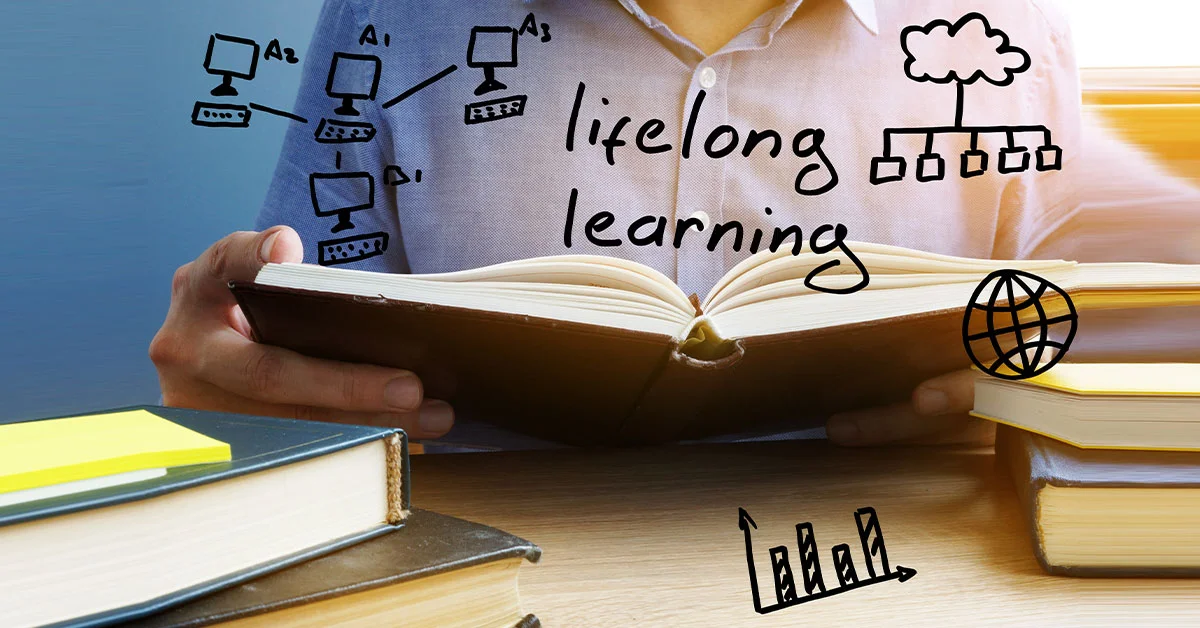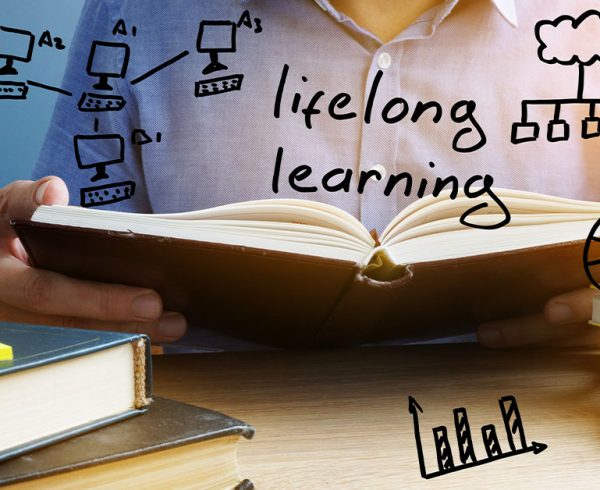Here’s all you need to know about lifelong learning, its importance, challenges, and solutions – all in one place!
Table of Contents:
- What is Lifelong Learning?
- How Can Educational Institutions Provide Lifelong Learning?
- How Can Your Students Pursue Lifelong Learning?
- Pros of lifelong learning in higher education
- Cons of lifelong learning in higher education
- Leverage Hurix LMS for Custom Learning Solutions
What is Lifelong Learning?
Lifelong learning is the ongoing, voluntary, and self-motivated pursuit of knowledge for either personal or professional reasons. It can include anything from formal education to self-directed learning.
How Can Educational Institutions Provide Lifelong Learning?
Here are 5 methods by which educational institutions can provide lifelong learning opportunities:
1. Offer continuing education programs
Educational institutions can offer continuing education programs or professional development opportunities for individuals who want to learn new skills or stay current in their field. These programs can be offered on campus or online, ranging from short courses to degree programs.
2. Provide access to educational resources
Educational institutions can provide access to a wide range of educational resources, such as libraries, online courses, and workshops, which can be useful for individuals engaging in self-directed learning.
3. Partner with industry organizations
Educational institutions can partner with industry organizations to provide learning opportunities and resources for their members.
4. Encouraging experiential learning
Educational institutions can also encourage experiential learning by providing students with real-world experience through internships, job shadowing, and other hands-on learning opportunities.
5. Promote a culture of lifelong learning
Finally, educational institutions can promote a culture of lifelong learning by encouraging students and faculty to engage in continuous learning and by recognizing and rewarding those who are committed to lifelong learning.
Read more: How to Promote a Culture of Lifelong Learning in the Classroom
How Can Your Students Pursue Lifelong Learning?
Your students can consider these 5 methods to pursue lifelong learning:
1. Take advantage of educational resources
Students can take advantage of the educational resources available, such as library resources, online courses, and workshops offered by their school or community.
2. Seek out internships or job shadowing opportunities
Internships and job shadowing opportunities can provide students with valuable hands-on learning experiences and allow them to explore different career paths.
3. Participating in extracurricular activities
Extracurricular activities, such as clubs, sports, and volunteer work, can be a great way for students to learn new skills and gain valuable experience.
4. Engage in self-directed learning
Students can also engage in self-directed learning by reading books or articles, following thought leaders in their field on social media, or experimenting with new technologies or approaches in their studies.
5. Seek out mentorship or coaching
Finally, students can seek mentorship or coaching from more experienced professionals or professors, providing valuable insights and guidance as they continue to learn and grow.
With so much said, it’s essential to understand the upside and downsides of lifelong learning:
Pros of lifelong learning in higher education
- It can help individuals stay current in their field and adapt to new technologies and changing job markets.
- It can help individuals develop new skills and expertise, making them more valuable to their current or future employers.
- It can provide individuals with the knowledge and skills they need to achieve their career goals.
- It can increase job satisfaction by helping individuals feel more engaged and motivated in their work.
- It can lead to increased earning potential, as well-educated individuals with a wide range of skills may be more attractive to employers and may be able to command higher salaries.
Read More: Advantages of Lifelong Learning for the Younger Generations
Cons of lifelong learning in higher education
- It can be time-consuming and may require a significant investment of time and money.
- It may be difficult for individuals to balance lifelong learning with other responsibilities, such as work and family.
- It may be challenging for individuals to stay motivated and focused on their learning goals.
- It may be challenging for individuals to find learning opportunities that meet their needs or interests.
Leverage Hurix LMS for Custom Learning Solutions
Let not the challenges scare you away – receive impeccable learning solutions for your educational institution. We at Hurix help you create tailored learning paths for your students.
Our Learning Management System:
- Provides a central point for storing and organizing course materials, such as lectures, assignments, and assessments.
- Facilitates communication and collaboration among students and instructors by providing a platform for discussion forums and other interactive features.
- Helps in tracking student progress and providing feedback to students and instructors.
- Enables the delivery of online courses and programs, making it easier for students to access course materials and participate in learning activities from any location.
- Reduces the administrative burden on instructors by automating tasks such as grading and tracking attendance.
- Offers educational institutions data and analytics to improve the learning experience and informed decision-making.
Get in touch with us at marketing@hurix.com for further details!








